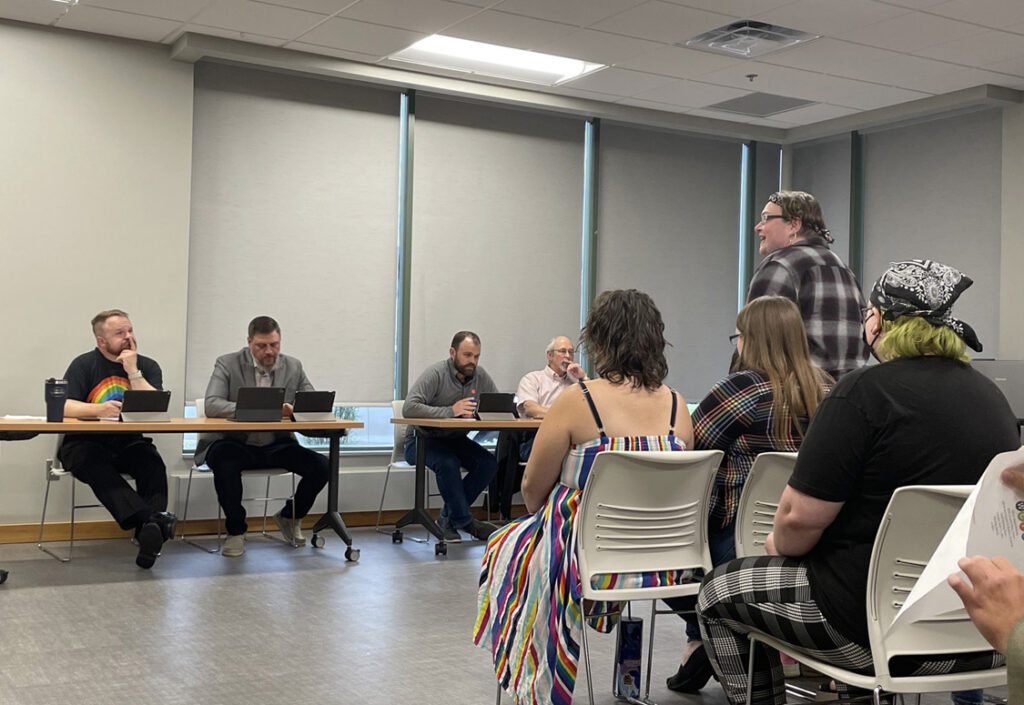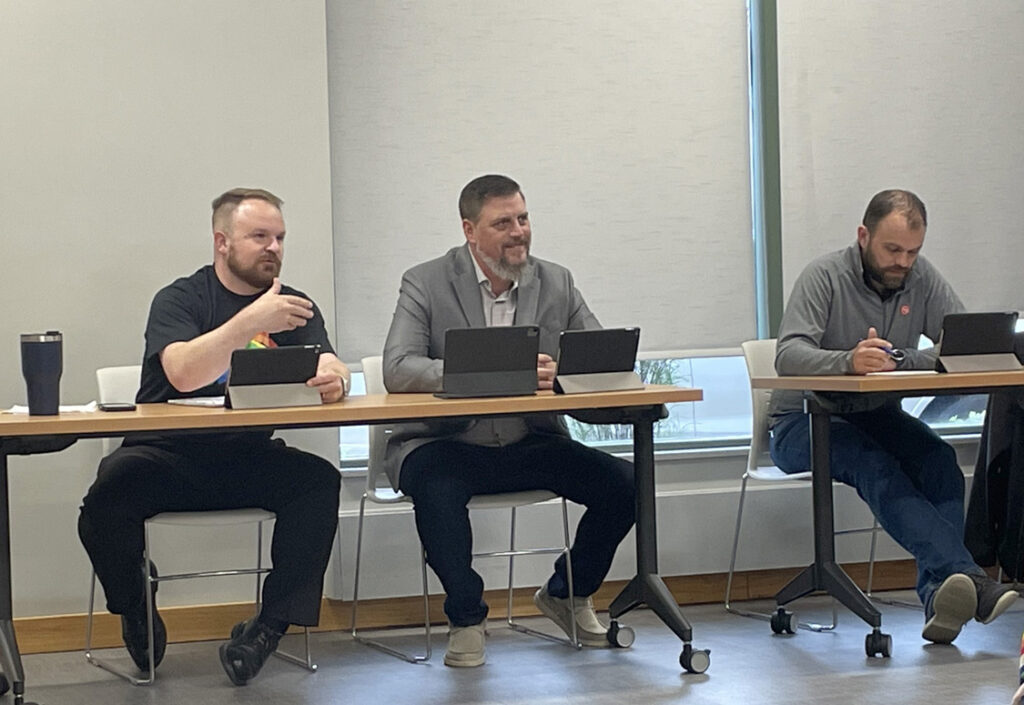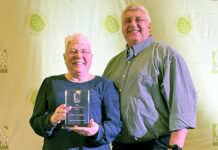By HOLLY GASKILL
Recent discussions about book displays in the Wells County Public Library brought a full crowd of spectators to the WCPL regular board meeting Tuesday.

The board is considering amendments to its policy regarding book displays to create a clear guidelines about appropriate themes and materials for display. Namely, this discussion has included LGTBQ materials and Pride Month themes.
Multiple attendants expressed that this action was being interpreted as an attack against many diverse communities within the county, not limited to LGBTQ individuals. Public comments were heard from 12 individuals for roughly 40 minutes.
“I believe it’s important to see yourself reflected in your own community, and that an inclusive and functional community would not work to alienate any group within it,” said Jennifer Kirnec. “A revision like this would do just that to library patrons that are LGBTQ, myself included. It sends a message of indifference and exclusion on the surface, but also touches on a broader message of prejudice and hatred towards any individual that does not fall into a very narrow category of Christian fundamentalism.”
Similarly, Marin Reinhard, a 12-year-old student at Norwell Middle School, said she wanted the library to continue to feel like a safe environment for people from all backgrounds.
“My family is a multiracial family and we want the library to be a safe place for everyone,” Reinhard said. “We love the library — and especially me because I love reading. We just want it to be a safe place, and we want everybody to feel loved and heard and seen.”
Bob Johnson was the only person who spoke in favor of restricting the display policy, saying he didn’t want LGBTQ topics to be “advertised” to children.
“I’m all for kids learning everything, but they should learn it from their parents, not from the library (displays),” Johnson said.
Board member Matt Yergler brought this item to the board’s attention ahead of its routine review. Yergler stated the action was unintended to make any patrons feel unwelcome in the library, but he felt the library should consider how they were elevating particular ideologies within their displays.

Yergler noted that the library isn’t permitted to display religious materials either. However, Library Director Sarah MacNeill later clarified the library is restricted from religious ornamentation, not book displays.
Ultimately, two policies were considered Tuesday — the original policy, which pertains to book displays organized by third parties, and another policy for displays organized by library staff. Neither policy was approved and will be revised considering the board’s feedback.
The first policy has been expanded from its original version to include specific topics deemed inappropriate. This section of the display policy reads: “Displays, postings, bulletin boards, and exhibits; when not related to library materials, programs, events, or activities; must not present one side or one view of a controversial subject. Displays, postings, bulletin boards, and exhibits on such issues as political views, gender identification, racial issues, or religious views should be avoided unless more than one view is represented. Questionable material is referred to the library director for final approval.”
To this, board member Dustin Brown stated there should be a mechanism for determining what items were considered “controversial.”
The second policy, drafted by board member John Stauffer, addresses materials featured by the library. It declares all library materials are suitable for display under an appropriate theme for awareness, education or entertainment. It also grants permission to library staff to manage these displays and adjust them as needed.
Regarding specific topics, the policy reads: “The topics should be appropriate for the section of the library they are to be displayed in. Examples of appropriate themes include but are not limited to: Federal Holidays, historical events and periods, life long learning interests, and various fiction themes. Examples of themes which should be avoided: singular positions political in nature, singular positions on scientific theory, representation of a single religion, representation of a single political party, topics which by nature exist to promote an idea.”
Stauffer expanded by stating he wants to create a welcoming environment for everyone in the community, but the library should consider a suitable way to display its materials. Rather than display categories of Pride Month or Black Lives Matter, which culturally contain political implications, Stauffer stated the library should consider categories of historical relevancy, like Juneteenth.
Brown agreed all materials were appropriate to display under a relevant category, but questioned how they should determine these categories. He suggested the library display materials similarly to their categorization within the library — a display for biographies, a display for fiction, and so on.
Board member Steve Tabor said this system would become muddied with the larger categories, like fiction.
“Perhaps we could go back to trusting our directors and department heads that are educated in the principles of libraries and allow them to do what they’ve been trained to do,” Tabor said.
Yergler, however, disagreed with the basis that every book in the library could be displayed.
“If every book in our library collection is worthy of display, then we can just display the same themes,” Yergler said.
The board then discussed reviewing previous displays to gain insight into how they might create the policy, which is where the board ended its discussion. The policy committee, composed of Yergler, Tabor and board member Kim Gentis, will continue revising the language.
Many of the other public comments echoed the sentiments shared by Kirnec and Reinhard, asking the board to shape the policy to recognize the diverse backgrounds of those within the community.
The library, said Kyra Stroud, saved her life at 13 years old. Stroud said she had come to the library to draft a letter before harming herself, but ultimately, knowing she was welcome in that environment allowed her to confide in a staff member.
Because of this story and others, John Huseman asked the board to consider its phrasing regarding where displays with certain information should be allowed. Huseman said it was clear young people were struggling with difficult topics, and should know that resources are available.
Rebecca Brown also recognized the hard work of the library staff amidst this conversation.
“(The staff’s) excitement and sharing the love of reading with others is never dampened by the appearance education or socioeconomic communities are situations in which those that they serve,” Brown said. “These librarians bring their A-game every day. They have no alternative — and shame on us for assuming that they do.”
Other comments were heard from Haley Ashman, Mellanie Hollingsworth, Carla Castro, Matthew Morales, Erin Butcher and Deb Barrick.
In closing, Stauffer thanked everyone for sharing their thoughts and experiences.
“I appreciate that everyone who came to share tonight was going to do so,” Stauffer said. “I know these are really difficult topics to talk about, and I’m thankful for the library staff that makes you all feel like you could come and do this. We as a board, want to make sure we continue to have the library be a place where you and your kids, my kids, my parents can all come in.”
holly@news-banner.com



